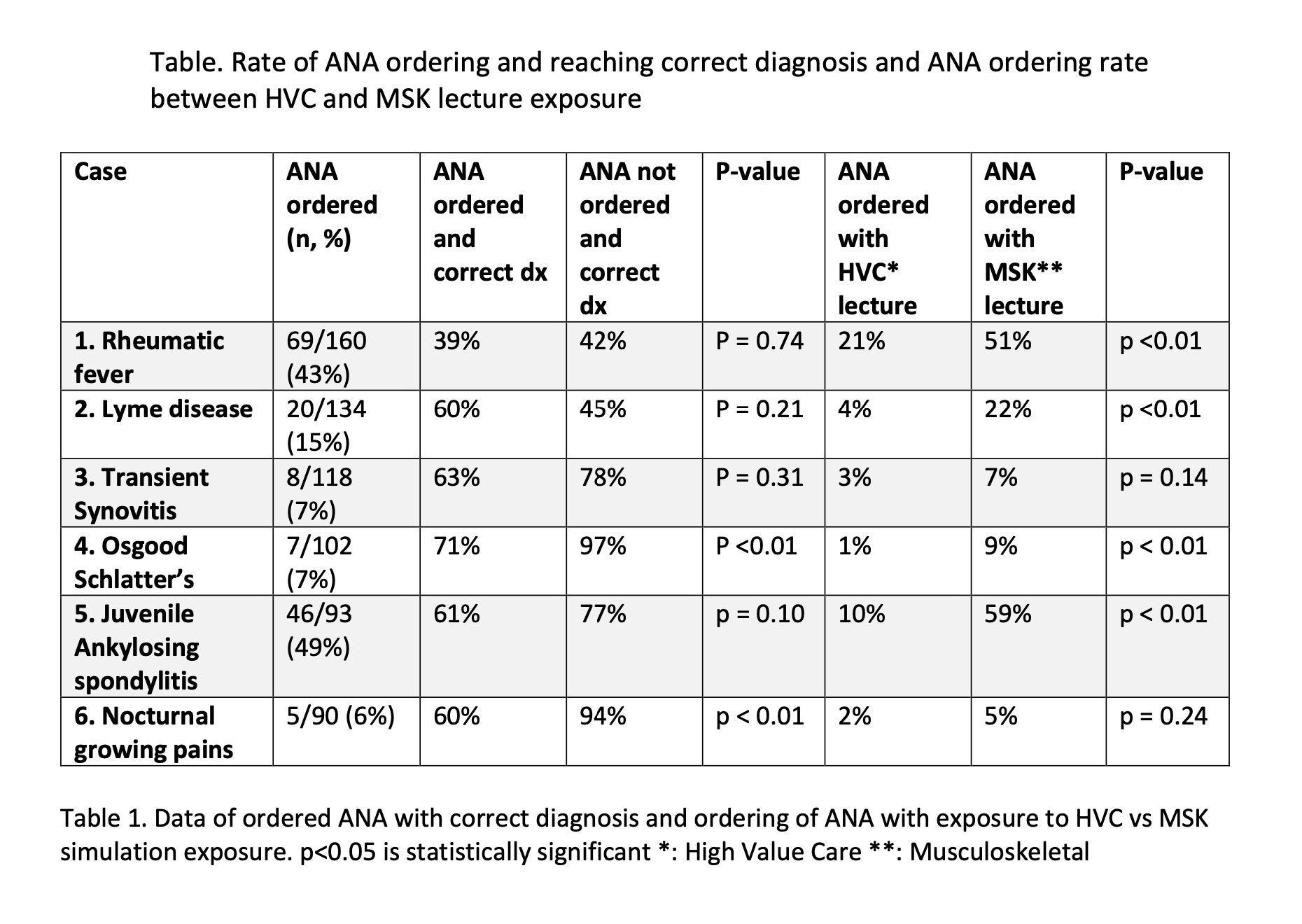Session Information
Session Type: Abstract Session
Session Time: 4:00PM-4:15PM
Background/Purpose: Our goal is to teach medical trainees high value care concepts and musculoskeletal (MSK) disease states and then implement online case-based simulations to evaluate trainee utilization of laboratory tests and imaging to make diagnoses.
Methods: We recruited pediatric trainees from 4 institutions to participate in this simulation. Learners listened to a lecture on either pediatric MSK complaints or high value care. Participants were then asked to complete an online simulation that presented six vignettes of pediatric MSK complaints and prompted them to select diagnostic tests. The presented cases included rheumatic fever, Lyme arthritis, transient synovitis, Osgood-Schlatter’s Disease, juvenile ankylosing spondylitis, and benign nocturnal limb pains of childhood. We analyzed trainee ability to identify the correct diagnosis from the available clinical information compared to pattern of diagnostic evaluation. In addition, we analyzed how exposure to high value care principles affected their likelihood of ordering diagnostic tests. We conducted an exploratory analysis using Student’s t-test for comparison of groups, with p-values less than 0.05 judged as statistically significant.
Results: Within the study, 160 trainees started and completed the first case, 90 completed all cases, and 87 completed all cases and the post-simulation survey. 32 received a lecture on high value care (HVC) and 55 received a lecture on pediatric MSK complaints. 41% of trainees selected the correct diagnosis in the rheumatic fever vignette, 47% in the Lyme arthritis vignette, 77% in transient synovitis, 95% in Osgood-Schlatter’s disease, 69% in juvenile ankylosing spondylitis, and 92% in growing pains. Among the six cases, antinuclear antibody (ANA) levels were ordered 6 to 49% of the time per vignette (see Table). Ordering an ANA level was associated with a decreased likelihood of selecting the correct diagnosis in Osgood-Schlatter’s disease (71 versus 97%, p < 0.01) and growing pains (60 versus 94%, p < 0.01). For each of the six cases results from ANA ordering was not associated with increases in selecting the correct diagnosis. In all six cases, trainees were less likely to request ANA levels if they were exposed to an HVC lecture prior to simulation, and this was statistically significant in 4 out of 6 vignettes.
Conclusion: Overall, trainees tended to order ANA more frequently in cases with higher diagnostic uncertainty and lower likelihood of selecting the correct diagnosis. Despite this, ordering an ANA had no significant difference on the trainee reaching the correct diagnosis. For the Osgood Schlatter’s and growing pains vignettes, there was a higher ratio of correct trainees who did not order an ANA, suggesting that ANA was only ordered if the trainee was uncertain. For test ordering, exposure to lectures on MSK pain in children was associated with increased lab and imaging orders, but exposure to HVC concepts was associated with decreases in testing. In summary, this research is important to share as it provides valuable insights for bettering diagnostic practices among trainees, which ultimately could lead to improved healthcare outcomes for children with MSK disease.
 Table. Rate of ANA ordering and reaching correct diagnosis and ANA ordering rate between HVC and MSK lecture exposure
Table. Rate of ANA ordering and reaching correct diagnosis and ANA ordering rate between HVC and MSK lecture exposure
To cite this abstract in AMA style:
McCarthey J, Driest K, frank e, Stephans A, Tarvin S, Robinson A. Multi-Center Use of an Online Case-Based Simulation to Evaluate Medical Trainee Use of Diagnostic Imaging and Lab Tests to Correctly Diagnose MSK Complaints [abstract]. Arthritis Rheumatol. 2025; 77 (suppl 9). https://acrabstracts.org/abstract/multi-center-use-of-an-online-case-based-simulation-to-evaluate-medical-trainee-use-of-diagnostic-imaging-and-lab-tests-to-correctly-diagnose-msk-complaints/. Accessed .« Back to ACR Convergence 2025
ACR Meeting Abstracts - https://acrabstracts.org/abstract/multi-center-use-of-an-online-case-based-simulation-to-evaluate-medical-trainee-use-of-diagnostic-imaging-and-lab-tests-to-correctly-diagnose-msk-complaints/
